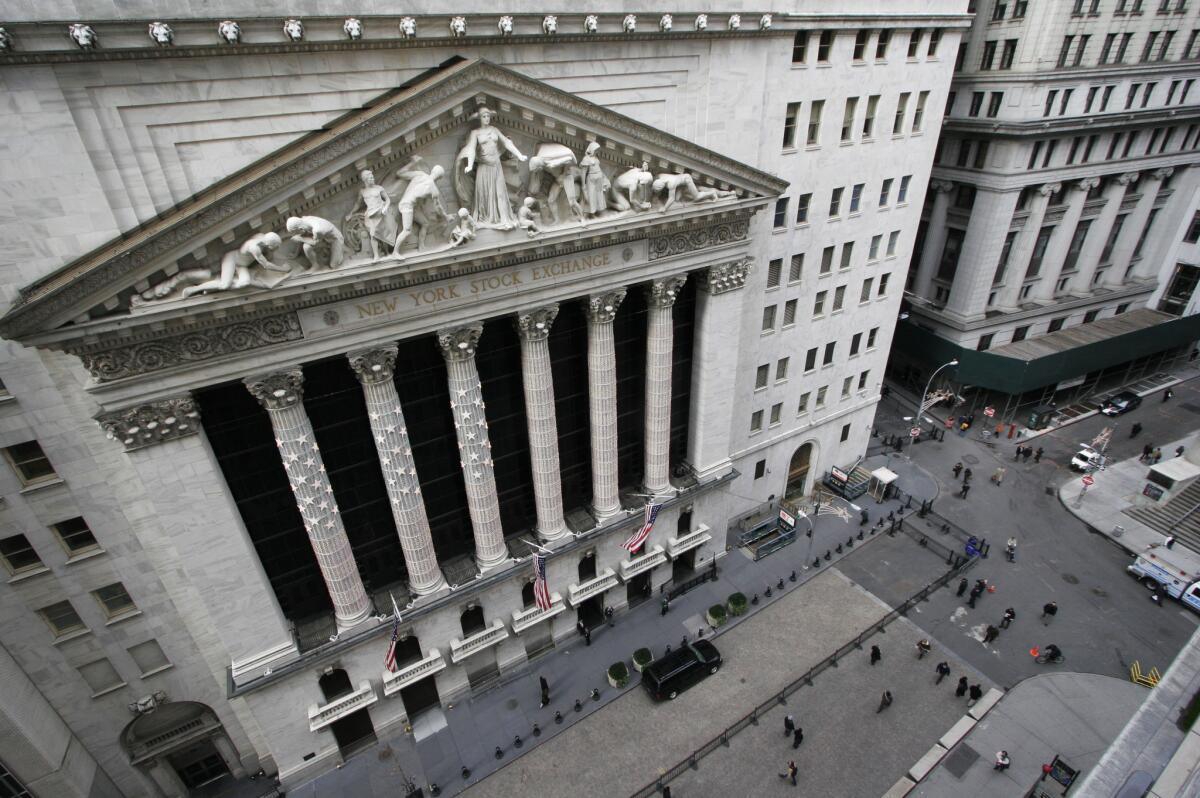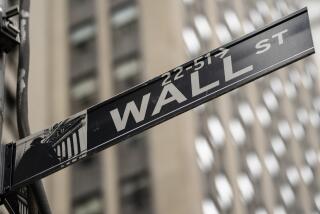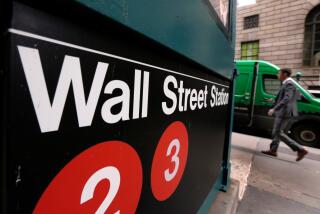Stock market enters a correction, down 10% from recent peak

- Share via
U.S. stocks slid again Thursday in response to the spreading coronavirus outbreak, pushing the market into a correction — that is, down 10% or more from a recent peak. The Dow Jones industrial average tumbled 1,190 points, its biggest point drop in history.
As investors increasingly feared that the virus would slow global economic growth, oil prices also tumbled again, and U.S. government bond yields hit fresh record lows as traders sought the safety of Treasury securities.
All three major U.S. stock indexes dropped more than 4% on Thursday. Their descent into correction territory was swift: Earlier this month, they were setting all-time highs.
Because the market has climbed so high during its 11-year bull run, the Dow’s massive point drop was nowhere near a record on a percentage basis. The blue-chip index fell 4.4% on Thursday, a far cry from the 22.6% plunge it took Oct. 19, 1987.
Still, Thursday’s drop — the biggest selling spree in two years — left the Dow 12.8% below the record high it reached Feb. 12. The index has lost 3,581 points in the last six sessions alone.
The broader Standard & Poor’s 500 slid 4.4% on Thursday to 2,978.76, down 12% from the record high it reached Feb. 19. The Nasdaq composite index skidded 4.6% to 8,566.48, down 12.7% from the record it set that same day.
More than 82,000 people in about three dozen countries are known to be infected with the COVID-19 virus, and more than 2,800 have died. The virus has also infected 60 Americans, including a newly confirmed case Wednesday in California, and there are fears it could spread quickly in the United States.
Wall Street is worried that if the virus isn’t contained, economic activity worldwide could slow and the earnings of U.S. companies with ties to China and other foreign markets could drop well below prior forecasts.
“We don’t know yet exactly how the virus is going to affect the industrialized world,” said A.C. Moore, chief investment strategist at Dunvegan Associates Inc. in Santa Barbara.
Moore said his firm has been selling stocks to build its cash position until “we get a picture of things starting to turn up a little bit” regarding the virus. “It’s an evolving issue, and we don’t know the full extent of it.”
Investors bid up prices of government bonds, and the yield on the benchmark 10-year Treasury note slid to a record-low 1.276%.
The stock market was especially ripe for such a jolt because it had just climbed to all-time highs. In addition, “historically the markets have averaged one 10% correction a year,” said Nela Richardson, investment strategist at the brokerage Edward Jones. “It feels jarring right now, but it’s not unusual historically speaking to see this kind of sell-off.” The latest market correction before this one was in December 2018.
Factory production and consumer demand in China, where the virus originated, already has slowed sharply, cutting into the sales of U.S. companies that do business in China or with Chinese firms.
For instance, Apple Inc.’s stock tumbled 6.5% on Thursday after Chief Executive Tim Cook called the outbreak a “challenge” for the technology giant. Apple produces hundreds of millions of iPhones and other devices each year in China and already had said the virus would harm its results.
Microsoft Corp. fell 7% after the software giant also warned that the outbreak is causing supply-chain disruptions that will dent its sales in the current quarter.
As the virus leads some nations to restrict travel and individuals to shun nonessential trips, travel-related stocks continued to be hammered. American Airlines Group fell 7.7%. Royal Caribbean Cruises lost 6.5%.
The high-flying stock of Tesla Inc. sank 12.8% to $679 a share amid fears that the virus will further slow production of the firm’s electric cars in China.
Traders also expect the virus to cut into demand for oil and gasoline. The price of crude oil on U.S. markets dropped 3.4% to $47.09 a barrel Thursday. Energy stocks fell along with oil prices. Exxon Mobil shares slid 6%.
There were spots of improvement. Starbucks Corp. Chief Executive Kevin Johnson said in a letter to employees Thursday that the number of new coronavirus cases in China was “slowing” and that there were “early signs of a recovery in the region.” As a result, Johnson said, Starbucks had reopened most of the stores it had closed in China because of the virus.
Starbucks’ stock still fell nearly 3%.
Amid the market mayhem, Clorox Co. eked out a fifth straight daily gain, reaching an all-time high, as investors bet on increased demand for the company’s hand sanitizers and disinfectants. The stock edged up less than 0.4%, capping a 2.8% gain over the last five trading sessions.
Virgin Galactic Holdings Inc., the space-tourism company whose share price had more than doubled this year as small investors and hedge funds piled in, went into a nosedive Thursday. The stock dropped 23.6% to $21.97 and has plunged 35% since Tuesday. Two analysts downgraded the stock Thursday after the company reported a fourth-quarter net loss of $72.8 million.
Some analysts have suggested that investors might want to buy into the market’s dip because of speculation that the Federal Reserve could cut interest rates in response to the coronavirus outbreak.
“While it is easy to turn cautious on the market” after a 12% drop, “we argue investors should not discount the benefit of announced and unannounced global policy responses that are likely to outlast the impact of COVID-19,” Dubravko Lakos-Bujas, JPMorgan’s chief U.S. equity strategist, said in a note Thursday.
Federal Reserve officials have said they’re closely watching the outbreak and its possible effect on economic growth, but the central bank has not changed interest rates.
Richardson, of Edward Jones, advised against buying just any stocks solely because they’re now cheaper. “No one knows for how long or how deep” the virus’ economic effect will be, she said.
If a long-term investor wants to buy certain stocks to fill out a diversified, long-term portfolio, “this might be a good time to do it,” Richardson said. “But you have to be strategic about it.”
Bloomberg was used in compiling this report.
More to Read
Inside the business of entertainment
The Wide Shot brings you news, analysis and insights on everything from streaming wars to production — and what it all means for the future.
You may occasionally receive promotional content from the Los Angeles Times.











